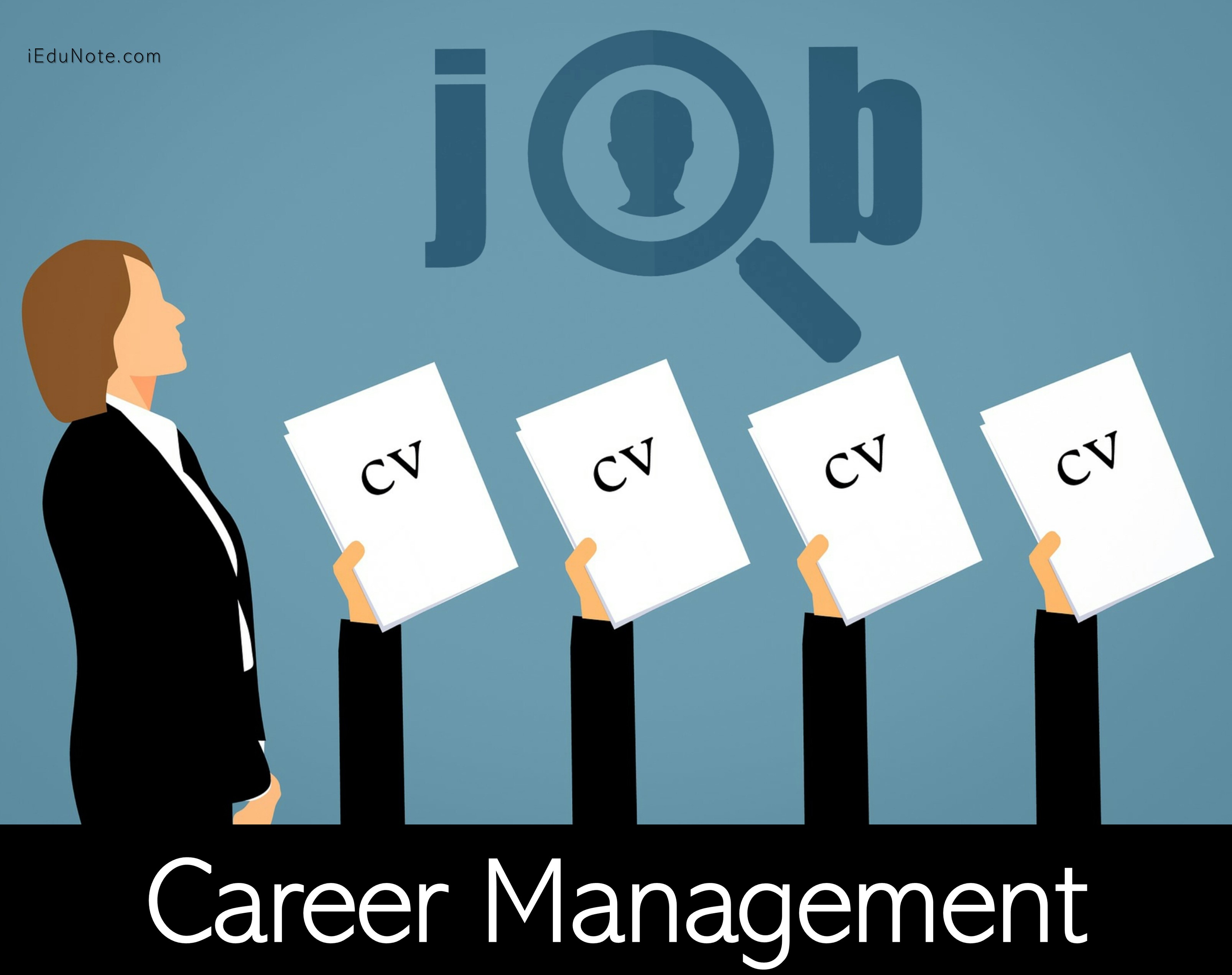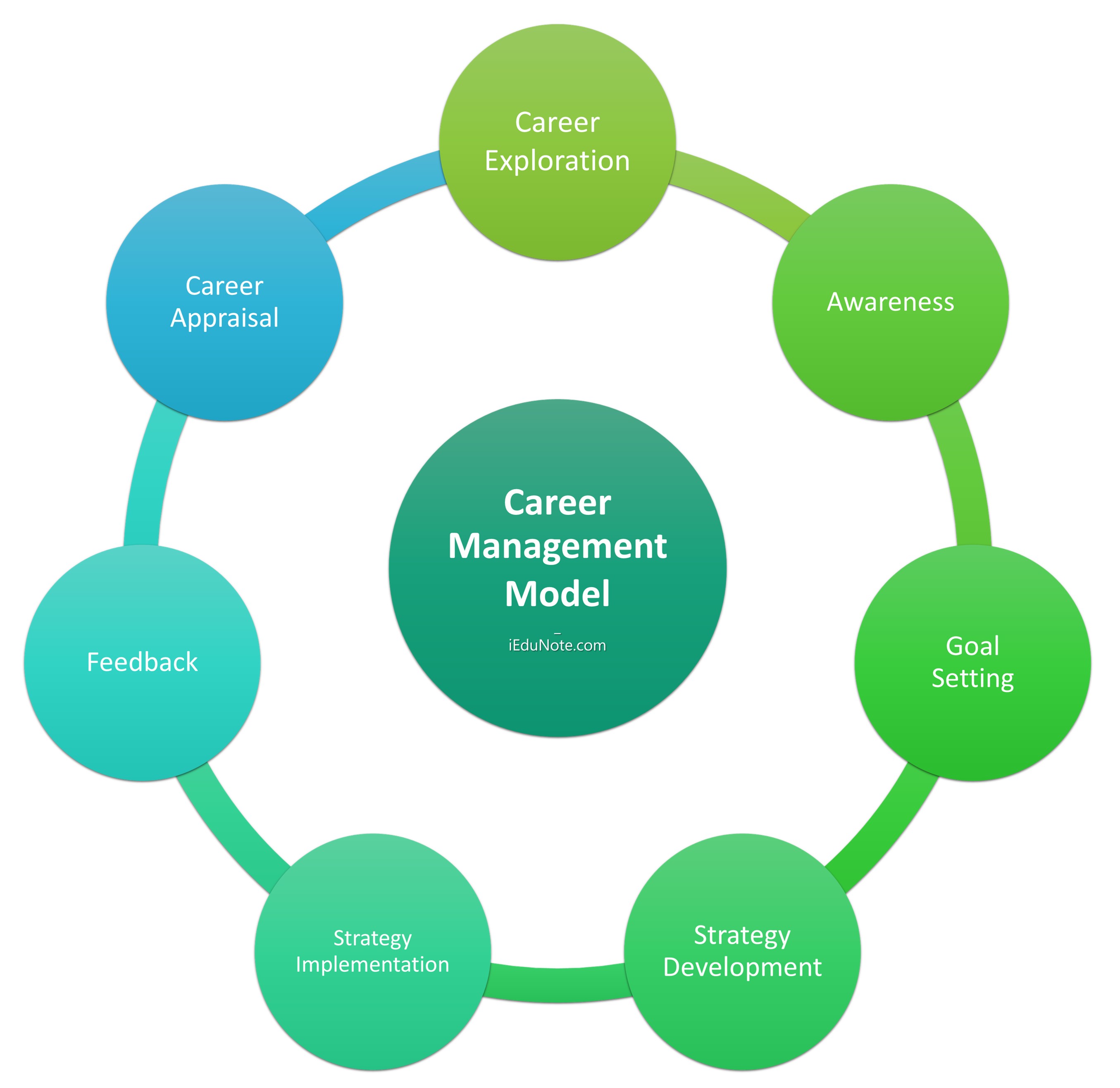Career management is the process of shaping your future career goals so that it adapts to the market challenges and demands and keeps your career trajectory upwards. Let’s understand how career management works.
What is Career Management?

Career management is the process by which organizational career planning is implemented, as shown in the table. Top management support is needed to establish a climate that fosters career development.
Efforts by the HR department to encourage career development have little impact unless supported by managers.
A commitment from top management is crucial. Without it, middle-level managers may show much less support for their subordinates’ career planning concerns.
All human resource activities within the organization must be coordinated, and human resource managers from various areas should be involved, at least as consultants.
The career-planning program must be open to all members of the organization, so they must be flexible to accommodate the variety of individual differences encountered.
Realistic feedback should be provided to participants with a focus on psychological success rather than advancement.
Without feedback about their career development efforts, it is difficult for employees to sustain the years of preparation sometimes needed to reach career goals.
HR departments can provide this information in several ways. One way is to give employees feedback about job placement decisions.
This feedback has three objectives:
- to assure bypassed employees that they are still valued and will be considered for future promotions if they are qualified,
- to explain why they were not selected, and
- To indicate what specific career development actions they should undertake. Many HR departments develop formal performance evaluation procedures to give employees feedback about their job performance.
Implementation of new programs should begin with small pilot programs that emphasize periodic assessment of employee skills and experiences of the program itself.
The role of supervisors is very important.
Their role includes communicating information about careers;
- counseling to help subordinates identify skills and options;
- evaluating subordinates’ performance, strengths, and weaknesses;
- coaching or teaching skills and behaviors;
- advising about the realities of the organization; serving as a mentor or role model for subordinates;
- brokering, or bringing together subordinates and those who might have positions better suited to them, and
- referring subordinates to opportunities.
Key ingredients for career management are;
- Coordination with other human resource activities.
- Involvement of supervisors.
- Use of human resource managers as consultants.
- Periodical skill assessment.
- Realistic feedback about career progress.
- Top management support.
- Equal access and open enrollment.
- Psychological focus on success rather than advancement.
- Flexibility for individual needs.
- Climate setting for career development.
- Small pilot programs.
- Periodic program assessment.
Definition of Career Management
Career management is an ongoing process. Without continual, conscious, and active career management, errors might be prolonged and repeated.
Moreover, the changing environment demands ongoing career management. Career management describes an individual’s active and purposeful management of a career.
In BM Staw and J. Ross (1987) words, “Career Management is a process by which individuals develop, implement, and monitor career goals and strategy.”
Career Management combines structured planning and the active management choice of one’s professional career.
The outcome of successful career management should include personal fulfillment, work/life balance, goal achievement, and financial security.
Greenhaus and Callanan are of the view that career management is an ongoing process by which a person:
- Gathers relevant information about himself/herself and the world of work.
- Develops an accurate picture of his/her talents, interest, values, and preferred lifestyle.
- Develops realistic career goals.
- Develops and implements a strategy to achieve the goal.
- Obtains feedback on the strategy’s effectiveness and relevance.
Career management is the lifelong process of investing resources to achieve your career goals. Career management is not a singular event but a continuing process necessary for adapting to the changing demands of the 21st Century economy.
Although the tactics will vary, career management focuses on two key investment assets to manage throughout our working years, our lifelong personal learning and our network of relationships.
Career Management deals with career and personal development, although they are not the same. Career development is the lifelong process of managing learning, work, leisure, and transitions to move toward a personally determined and evolving preferred future.
The study of career development looks at how individuals manage their careers within and between organizations and how organizations structure the career progress of their members. It can also be tied into succession planning within most organizations.
While personal development is the total constellation of psychological, sociological, educational, physical, economic, and chance factors that combine to influence the nature and significance of work in any given individual’s lifespan.
Indicators of Effective Career Management
Many people do not have the proper skills to manage their skills properly. Career management is a problem-solving and decision-making process. Greenhaus and Callanan have identified four indicators of effective career management.
They suggest that effective career management requires:
- Deep knowledge of the employee himself/herself and an accurate picture of the environment.
- The development of realistic goals that are compatible with one’s values, interests, abilities, and desired lifestyle,
- The development and implementation of appropriate career strategies and
- Continual feedback process that permits adaptation in the face of the changing situation.
Benefits of Career Management
Career management services are beneficial for both the organization and the individual.
- Developing employees who will go the extra mile and understand the benefits of building a partnership with their employer.
- Reaping the rewards of a workforce that has been given the tools needed to leverage its strengths.
- Increasing employees’ morale by helping them visualize their careers within an organization.
- Supporting human resources managers must attract, retain, develop and terminate employees.
- Developing the insight required to increase employee commitment and satisfaction.
- Gaining employee support for the implementation of critical business objectives and strategies.
- Career management services increase employee motivation and engagement with their employers.
- Identifying employees’ skills, interests, and career objectives.
- Offering employees an opportunity to explore new work possibilities.
- Developing a personalized career action plan.
- An individual with follow-up tactics ensures his objectives align with his career goals.
Career Management Model: 7 Components
A model is a picture or representation of reality.
The career management model describes how people should manage their careers. It is the abstraction of reality. It is a standard or example for imitation or comparison. It contains a set of variables related to each other in a specified manner so that we can better understand some piece of the world.

The career management model consists of a 7 important components.
1. Career Exploration
Career exploration is the collection and analysis of information regarding career-related issues.
One should be aware of his talent, interest, values, the importance of work in his total life, about alternative jobs inside or outside the organization. Career exploration promotes awareness.
Most people do not know themselves. They may overestimate strengths in certain areas and judge themselves as more talented than they are.
“Know thyself’- is one of the important messages suggested by the great philosopher Socrates.
There are two types of career exploration; self-exploration and environmental exploration. Career exploration should enable an individual to become more fully aware of himself and his environment.
Self-exploration
Self-exploration can provide a greater awareness of personal qualities. A person ought to gain insight, for example, into his values, interests, and talents in both his work and non-work lives.
He should become more aware of job options, their requirements, and opportunities and obstacles in the environment.
People may come to possess a deep understanding of the activities they like or dislike and the challenge they want from their jobs. Self-exploration provides information about strengths, weaknesses, talents, and limitations.
It can also better understand the balance of work, family, and leisure activities that best suit a preferred lifestyle.
Self-awareness or self-assessment involves identifying and understanding one’s interests, skills, and values as a foundation for career decision-making, planning, and action.
Assessing and understanding your interests, skills, and values is the first step in identifying the career path that is right for you.
There is a big difference between getting a job and pursuing a career you love.
Research has shown that individuals who choose careers closely aligned with their interests, skills, and values are more satisfied and enjoy greater career success.
The self-assessment process is important in pursuing your first internship or job after college and throughout your life, as you move forward in your career.
Environmental exploration
It helps a person learn more about some aspects of the environment.
Environmental exploration includes occupations, industries, necessary skills, job alternatives within a given organization or alternative future jobs, experience needed to move from a current line position to a staff position, company alternatives, and the impact of family on career decisions.
There are many beneficial effects of career exploration on career management:
- enhanced awareness of self and environment,
- more aware of yourself and your chosen career,
- helps to develop occupational goals,
- people develop more extensive career strategies and perform more effectively in job-interview situations,
- more aware of themselves and the world of work.
2. Awareness
Exploration increases awareness. Awareness is a central concept in career development. Awareness is a relatively complete and accurate perception of a person’s qualities and characteristics in his relevant environment.
A thorough awareness of self and environment allows a person to set the right career goals and strategies.
3. Goal Setting
People set career goals to maintain motivation, have something to look forward to, and achieve success.
Effective career goals follow the SMART model. They are specific, measurable, achievable, realistic, and have a timeline.
A career goal is a desired career-related outcome that a person intends to attain.
The goal may be to attain the position of assistant plant manager in a specified period and to move into a project engineering position.
Greater awareness of self and environment can help the individual choose a career goal to pursue.
Career goals must be specific and concrete to develop an effective strategy to achieve the goal. The career goal of a person is to receive quick promotion.
Career goals involving a promotion require careful planning and execution.
The employee must determine a timeline and may need to complete additional steps, such as completing additional work tasks, developing a working relationship with other department members, and updating a resume.
The additional tasks the employee must complete before earning a promotion are short-term goals, and the promotion is a long-term goal.
We must write one sentence about a career goal or objective in our resume. A career goal is an important part of a resume.
This statement helps the employer know your motive for a job, so they can determine whether your goal aligns with their organization and the position available.
The career objective of Sonia, an MBA student in the management department, is “to pursue a highly rewarding career, seeking a job in a challenging and healthy work environment where I can utilize my skills and knowledge efficiently for organizational growth.”
4. Strategy Development
A strategy is a plan chosen to bring about a desired future, such as the achievement of a goal or solution to a problem. A career strategy is a sequence of activities designed to help an individual attain a career goal.
A career strategy is a structured approach to developing capabilities, tools, and resources in an organization, which will enable people to navigate their career ‘journey’ successfully.
Establishing a realistic goal or set of goals can facilitate developing and implementing a career strategy.
Many organizations develop explicit strategic plans that enable them to pursue their goals successfully.
Experts identify different kinds of strategies that employees can use to improve their chances of career success.
The main strategies are, for example, competence in the present job, extended work involvement, development of skills through training, opportunity development, development of supportive relationships (mentors, sponsors, and peers), image building, and organizational politics.
5. Strategy Implementation
Strategy implementation is the process that puts plans and strategies into action to reach goals. Implementing a reasonable strategy can produce progress toward the stated career goal.
You must give priority and time to implementing your career action plan to ensure you achieve your desired outcomes and commit to a lifelong learning strategy to stay employable.
Some steps a person may need to take to implement his action plan include the following;
- seek advice from your supervisor regarding ways to implement your action plan and fill any gaps in skills and experience,
- engage in short-term development training to develop identified skills,
- enroll to do a more formal study,
- investigate hidden opportunities both within and outside the organization, explore how to develop good networks inside and outside the organization,
- know-how, negotiating salary or conditions and committing to a lifelong learning strategy to stay employable.
6. Feedback
Feedback is a response to the sender of a message. The implementation of a career strategy can provide useful feedback to the person. This feedback can enable the person to appraise his career.
Great supervisors know that motivating employees is about more than charisma and vision.
To help employees perform their best, a great manager will provide feedback-the right kind, at the right time.
When you become a master of delivering effective feedback, both positive and negative, you help your employees develop their skills and maximize their performance.
To verify the effectiveness of career progress, a person must have feedback.
The accomplishment of a career goal is confirmed by feedback. Feedback should be specific, timely, and sincere. There are some tips for effective feedback.
7. Career Appraisal
Whether or not a person is progressing toward a goal, implementing a career strategy can provide useful feedback.
This feedback, in conjunction with other work and non-work sources, can allow a person to appraise his or her career.
Career appraisal is how people acquire and use career-related feedback to determine whether their goals and strategies are appropriate.
Career appraisal permits a person to monitor the course of a career and represents adaptive and feedback functions of career management.
The career appraisal process may lead to a reexamination of career goals. The additional information obtained from career appraisal becomes another tool for career exploration that continues the career management cycle.
For example, you may discover that you have performed poorly on your job’s newly acquired managerial portions. This appraisal might make you consider changing your goal; you may no longer wish to enter management.
Or you may retain the goal but revise the strategy. You might choose to pursue a graduate degree in management.
The career management cycle is a problem-solving process. It is also known as the decision-making process.
It is essential to gather information so that individuals can become aware of themselves and the world around them.
Goals are established, plans are developed and implemented, and feedback is obtained to provide more information for ongoing career management.

